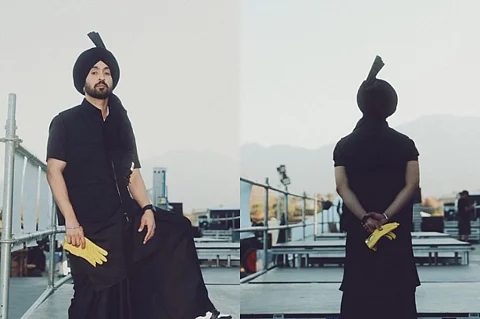
- HOMEGROWN WORLD
- #HGCREATORS
- #HGEXPLORE
- #HGVOICES
- #HGSHOP
- CAREERS
- ABOUT US
- CONTACT US

This past weekend saw the return of Coachella, a music festival that’s come to occupy a significant amount of real estate across the global pop cultural landscape. In many ways, what we see at the festival is a reflection of the trends, the aesthetics, and the mindsets of the times we live in. Coachella is a festival where celebrity and ‘civilian’ identities become all the more blurred, with the who's who of LA and Tinseltown all descending and merging with the masses in an attempt to occupy space and cling to their own arbitrary ideas of relevance amidst a flurry of grandiose musical performances.
Despite the seemingly shallow trajectory of the majority of mainstream festivals of late, this year’s line-up of artists was far more culturally diverse than we’ve ever seen it; featuring a number of notable South Asian artists that included singer/songwriter Ali Sethi, producers Jai Wolf and Jai Paul and global pop superstar Charlie XCX. (I was today years old when I found out she was half Gujarati.) Most relevant for India and its diasporic communities, however, was the electric Saturday evening performance by Punjabi singer and actor Diljit Dosanjh, who became the first Punjabi-language singer to ever perform at the festival.
Diljit’s debut points to the fact the fest has gradually transitioned from line-ups that program and cater exclusively to cis-gendered, heteronormative, white-centric tastes and preferences to ones that attempt to keep in step with a more globalized ear. The last two line-ups following the pandemic have made signficant leaps forward in amalgamating sounds and identities that go beyond the formulaic as well as the tried and the tested. As individuals from BIPOC communities gain firmer footholds in key facets of American society at large, we’re seeing spaces and events evolve to maintain relevance. The result is festivals that are to a large extent representative of a globalized world where individuals from across cultures can find resonance and representation wherever they turn.
For Sikhs, Punjabis, and Indians from the subcontinent as well as across the world, Diljit’s performance carries a great deal of weight and significance. From a representation point of view, as an actor Diljit was one of the first turbaned individuals to play lead roles that defied the comedic relief tropes that Sikhs have consistently been pigeonholed into. His billing at Coachella took this a step further by introducing and normalizing turbaned identity and culture and providing young Sikhs with a source of inspiration and an identity to relate to via one of the largest global music stages.
South Asians as a whole can also be inspired by the fact that he was able to perform without needing to compromise on his artistic or cultural identity; delivering rousing renditions of some of his most popular hits while showcasing the beauty of his native tongue. In a world where individuals can often feel alienated or othered because of language barriers, Diljit shows us the importance of authenticity and that you don’t need to change your identity or the way you speak to find acceptance.
Beyond this, Diljit has been instrumental in reviving grassroots and folk music through collaborations with various artists including notable Punjabi playback singer Gurdas Mann. He shares a particularly unique connection with younger generations in India and has crafted an image both in person as well as online that merges modern, Western, and desi sensibilities and aesthetics with an effortless and almost casual ease. This relatable image has allowed him to act as a powerful voice for the people he represents, as we saw when he spoke up during the turbulent farmer protests in 2020 and 2021.
His performance at Coachella represents the latest peak in Diljit’s climb to the top and by remaining true to his own cultural authenticity, he has brought Punjabi, Sikh and South Asian identities to the very front of the global cultural consciousness. Performances like this are vital in the way that they bridge gaps between a myriad of diverse ideas and identities. While it's still early days, more shows by artists similar to Diljit could very well pave the way for a truly equitable industry that recognizes the artistry of diverse communities and erodes the lines of arbitrary division that have traditionally kept them from truly thriving.
If you enjoyed reading this, here's more from Homegrown:
How The UK’s First Bhangra Group Rooted Indian Identity In A Foreign Land
Remembering Punjabi Rapper Sidhu Moosewala’s Legacy, Talent, & Artistry
Memoirs Of A Captivating Punjabi Punk: Meet The Cockney Sikh
